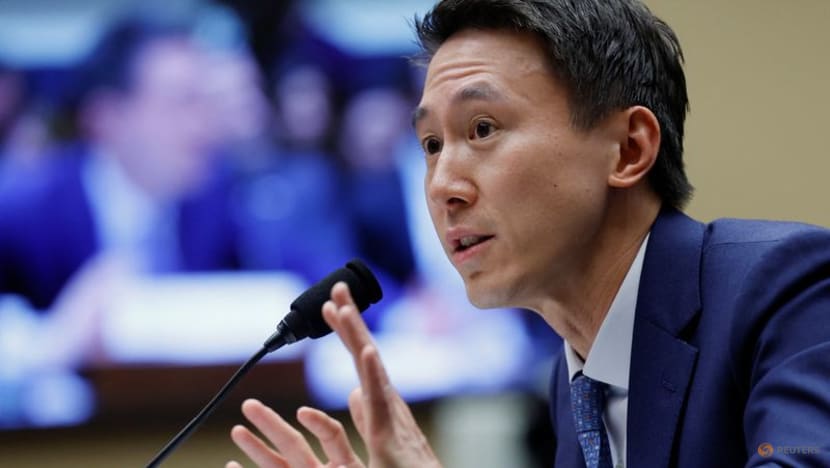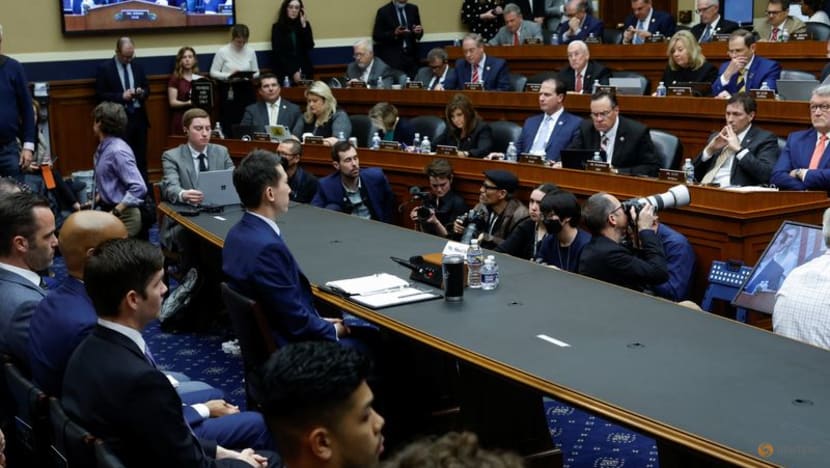Advertisement
Chew Shou Zi’s performance at a hostile congressional hearing was a missed opportunity for TikTok, says NTU’s Mark Cenite.

SINGAPORE: Singaporeans love to see how one of their own performs on the world stage, I’ve observed in two decades of teaching here.
For five hours on Thursday (Mar 23), all eyes were on TikTok CEO Chew Shou Zi , who was born in Singapore and is based here, as he testified in the United States House of Representatives.
This fresh-faced 40-year old surely aced some difficult tests before. After graduating from the Hwa Chong Institution, he became an army officer. He studied economics at University College London before earning his MBA from Harvard Business School.
He ascended to the top spot at TikTok in 2021. “I am responsible for all the strategic decisions at TikTok,” Chew told the New York Times last year.

The reviews of his biggest test yet are trending negative in the US. Glenn Gerstell, former general counsel of the US National Security Agency, called it “nothing less than a disaster” for TikTok.
But I’ll give Chew a clear pass because the task he faced was close to impossible.
LIKE A SCHOOLBOY CALLED TO THE PRINCIPAL’S OFFICE
The hearing felt as if the schoolboy was called to the principal’s office to get lectured – and not allowed to talk back. At times Chew asked the committee chair for time to respond but the chair refused, giving the floor to the next congressperson instead.
Over and over again, American legislators asked for a yes or no answer. When Chew tried instead to elaborate, they demanded “Yes or no?”, cutting him off. It’s a tried and true rhetorical technique for creating the impression that the witness is evasive, and that’s how congresswoman Debbie Lesko described Chew.
Such grilling is somewhat to be expected. Generally, witnesses are called to Congress to be held accountable – in this case for a multibillion dollar corporation with ties to an American adversary. Meta CEO Mark Zuckerberg and other Facebook and Instagram executives have faced hours on the ropes over concerns including child safety.
Chew maintained his composure, so there are no viral videos of him losing it.
At times Chew’s politeness seemed too deferential, however. When interrupted, he would respectfully yield. With a bit more assertiveness, he could have attempted to quickly complete his points and avoid being led into carefully set traps.
“DANCING WITH WORDS”
On rare occasions those testifying to Congress win some praise. Dr Anthony Fauci did during COVID-19 hearings. Lieutenant Colonel Alexander Vindman did during former president Donald Trump’s impeachment. Their testimony shares common features: It gets described as direct and candid.
Chew was described instead as a “good dancer with words” by Democratic Representative Tony Cardenas. Choosing words like a lawyer or publicist only goes so far in a room full of lawmakers.
A clip that drew criticism showed Representative Neal Dunn asking if ByteDance spied on Americans. Chew replied, “I don’t think that spying is the right way to describe it”.
Chew highlighted that the company planned to implement a new data storage plan called “Project Texas”, described with a great soundbite: “American data is stored on American soil by an American company, overseen by American personnel”.
Lawmakers pounced, pointing out that the plan only addresses how American users’ data will be handled in the future, not the terabytes already collecting from the app’s 150 million American users.
When Chew was asked if he has “100 per cent certainty” that Chinese authorities could not use TikTok for surveillance or propaganda against Americans, he replied instead that “it is our commitment” not to allow government manipulation. To the comment that there are Chinese laws under which the authorities can demand corporations’ cooperation, he only went so far to say that he had seen “no evidence” that China had accessed data.
Lawmakers reminded Chew repeatedly that he was legally obligated to tell the truth, another classic rhetorical strategy. US reporter Sara Fischer tweeted, “He is doing a good job of not perjuring himself, but it’s not making for a convincing testimony”.
If he couldn’t offer sufficient assurance about Chinese ties, perhaps he could have been more concrete about the company’s plans to address the committee’s other concerns: Combatting misinformation and other harms, especially to youths.
But Democratic Representative Diana DeGette said, “You gave me only generalised statements that you’re investing, that you’re concerned, that you’re doing work. That’s not enough for me. That’s not enough for the parents of America”.
STRONG BIPARTISAN MOMENTUM AGAINST TIKTOK
Stock prices of TikTok’s competitors, Meta and Snap, edged up during the hearing, suggesting that investors were not comforted. The bipartisan political momentum against TikTok is strong, against a backdrop of broad American concern about China on economic, geopolitical and human rights issues.
The Biden administration may demand that ByteDance sell its shares in TikTok, though the legal basis for such an order is unclear. China’s Ministry of Commerce said it would oppose a forced sale, which some interpreted as a further indication of Beijing’s sway.
Without a sale, the US may join India in banning TikTok. Americans have discussed a ban for three years, since the Trump administration proposed it but the courts held it up. TikTok noted in a press release how little discussion there had been at the hearing of the First Amendment implications of a ban.
Chew gets full marks for grace under enormous pressure. But he fell short on building the trust, through openness, that is required for persuasion at this crucial moment for the company. Such responsibilities, while daunting, come with the power he wields.
Dr Mark Cenite is Associate Dean (Undergraduate Education) at Nanyang Technological University’s College of Humanities, Arts, & Social Sciences. He teaches communication law at the Wee Kim Wee School of Communication and Information.


